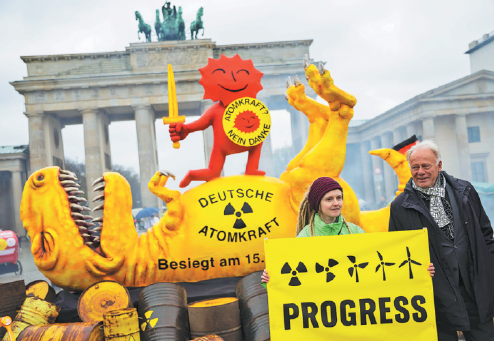Germany closes its last three nuclear power plants

BERLIN — Germany has switched off its remaining three nuclear power plants as part of a long-planned transition to renewable energy.
The Emsland, Neckarwestheim II and Isar II stations were shut down shortly before midnight on Saturday.
It was the end of an era, the energy utility RWE said, confirming the three reactors had been disconnected from the grid.
Decades of antinuclear protests in Germany, stoked by disasters at Three Mile Island in the US, Chernobyl in Ukraine and Fukushima in Japan, had put pressure on successive governments to end the use of a technology that critics argue is unsafe and unsustainable.
Defenders of atomic energy say fossil fuels should be phased out first as part of global efforts to curb climate change, and that nuclear power produces far fewer greenhouse gas emissions and is safe if it is properly managed.
As energy prices rose last year because of the conflict in Ukraine, some members of German Chancellor Olaf Scholz's government got cold feet about closing the nuclear plants as planned on Dec 31. In a compromise, Scholz agreed to a one-time extension of the deadline, but insisted that the final countdown would happen on April 15.
Europe's largest economy has been looking to abandon nuclear power since 2002, but the phaseout was accelerated by then chancellor Angela Merkel in 2011 after the Fukushima nuclear disaster that year.
Antinuclear demonstrators took to the streets in several German cities to mark the closures.
Germany also powered up some of its mothballed coal-fueled plants to cover the potential gap left by gas.
Calls for delay
The challenging energy situation had increased calls domestically for the exit from nuclear power to be delayed.
Germany had to "expand the supply of energy and not restrict it any further" in light of potential shortages and high prices, Peter Adrian, the president of the German chamber of commerce, told the newspaper Rheinische Post.
Friedrich Merz, leader of the opposition CDU party, said abandoning nuclear power was the result of an "almost fanatical bias".
The three final plants provided just 6 percent of Germany's energy last year, compared with 30.8 percent from all nuclear plants in 1997.
"Sooner or later" the reactors will start being dismantled, Economy Minister Robert Habeck said before the scheduled decommissioning, brushing aside the idea of an extension.
Instead, Habeck is focused on getting Germany to produce 80 percent of its energy from renewable sources by 2030.
To this end, Scholz has called for the installation of "four to five wind turbines a day" over the next few years, a tall order given that just 551 were installed last year.
But the current rate of progress on renewables could well be too slow for Germany to meet its climate protection goals.
Despite planning to abandon nuclear energy, Germany has not "pushed ahead enough with the expansion of renewables in the last 10 years", Agence France-Presse quoted Simon Mueller of the think tank Agora Energiewende as saying.
To build enough onshore wind capacity, Germany now has to "pull out all the stops", he said.
Agencies - Xinhua































